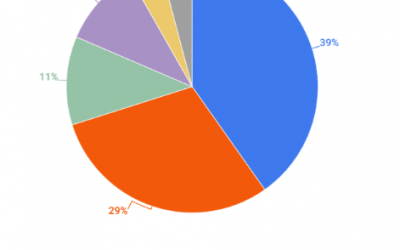Landing a data analyst role at a top-tier company in Silicon Valley—whether it’s Google, Meta, Airbnb, or a fast-growing AI startup requires more than knowing how to write SQL queries or build dashboards. Today’s data-driven companies expect analysts who can turn data into strategy, insights into decisions, and dashboards into narratives.
With fierce competition and rapidly shifting expectations, having strong technical knowledge is just the start. You need to prove that you’re not just learning data; you’re ready to work with it. That’s where your skills, mindset, and portfolio need to align with what a Bay Area data science job truly demands.
In this post, we break down the essential skills and training paths that can help you stand out, especially if you’re transitioning through a data science boot camp or have just completed formal data science courses.
Why Data Analysts Are in High Demand in the Bay Area
Over the past year, the Bay Area data science job market has experienced rapid growth, fuelled by innovation in artificial intelligence, cloud infrastructure, and product-led analytics. According to recent hiring trend reports, there’s been a 30%+ increase in recruitment for data-focused roles as companies double down on data-driven strategies.
Positions like Data Analyst, Data Engineer, and Machine Learning Engineer have seen some of the fastest growth, especially in mid-size tech firms and high-growth startups where data professionals are no longer just support; they’re central to decision-making and product direction.
But landing a role at top-tier companies like Stripe, Tesla, or Google requires more than technical expertise. Employers in the Bay Area are looking for analysts who can combine strong analytical skills with real-world project experience, a solid grasp of business context, and the ability to communicate insights.
Your ability to turn data into decisions and tell a story with your findings ultimately sets you apart in this highly competitive landscape.
Source: analyticsvidhya
1. Core Technical Skills You Can’t Skip
Before you impress a hiring manager at Google, Tesla, or Meta, you need to have your technical foundation locked in. These aren’t just “nice-to-haves”; they’re the baseline requirements for any Bay Area data science job.
Whether you’re self-taught, working through online data science courses, or enrolled in a structured data science boot camp, these are the core tools you must master.
| Skill | Why It Matters |
| SQL | Must-have for data extraction, transformation, and analysis. |
| Excel & Spreadsheets | Common in day-to-day analysis and stakeholder reporting. |
| Python or R | Mostly data manipulation. In some jobs statistical analysis. |
| Data Visualisation | Tools like Tableau, Power BI, and Plotly bring your insights to life. |
| Statistics | Essential for A/B testing, regression, and forecasting. |
These are typically taught in data science training programs and boot camps, but the key is to move from “learning” to “applying.”
2. Business Intelligence & Product Thinking
Top-tier companies aren’t just looking for analysts who can crunch numbers—they seek professionals who can derive actionable insights that drive strategic decisions. Understanding the “why” behind the data is crucial. This involves identifying key performance indicators (KPIs), discerning user behavior patterns, and pinpointing areas for product improvement.
Business Intelligence (BI) plays a pivotal role in this process. BI involves collecting, analyzing, and presenting business data to support decision-making. By transforming complex data into actionable information, BI analysts help businesses make smarter decisions, impacting nearly every part of an organization—from improving operational efficiency to influencing long-term strategic planning.
Moreover, integrating data science with product design, often called “Data Thinking,” allows for developing data-driven solutions that enhance user experience and inform decision-making through data-driven insights.
Portfolio Tip: To showcase your proficiency in BI and product thinking, consider creating a project that analyzes user engagement trends, churn rates, or revenue breakdowns. Tie your findings to business decisions, demonstrating how your insights can influence product development or marketing strategies.
3. Communication & Data Storytelling
Source: BarC
In the realm of data analysis, the ability to communicate findings effectively is just as crucial as the analysis itself. It’s not enough to crunch numbers; one must also translate those numbers into narratives that drive action.
This skill, often referred to as data storytelling, involves presenting data in an understandable and engaging way, enabling stakeholders to grasp insights and make informed decisions.
Many early-career professionals, even those who have completed comprehensive data science courses, find this aspect challenging. They may excel at technical analysis but struggle to convey their findings compellingly.
To bridge this gap, it’s essential to focus on clear visualizations, straightforward explanations, and contextual applications of data.
Portfolio Tip: To demonstrate proficiency in data storytelling, consider including the following elements in your portfolio:
- Clear Visualizations: Utilize tools like Tableau, Power BI, or Python libraries such as Matplotlib and Seaborn to create intuitive charts and graphs.
- Simple Explanations: Accompany your visualizations with concise summaries that explain the significance of the data and the insights derived.
- Contextual Use Cases: Provide scenarios or case studies where your analysis has practical applications, highlighting the impact of your work on decision-making processes.
4. Real-World Project Experience (Your Biggest Asset)
If there’s one thing that separates candidates who land interviews from those who get passed over, it’s real-life project experience. Employers want more than just academic knowledge—they want to see how you apply it in real-world business contexts.
At Magnimind, we’ve helped thousands of students confidently transition into data roles. Based in Palo Alto, California, in the heart of Silicon Valley, our boot camp and data science courses are built around a portfolio-first learning model designed to get you job-ready, not just classroom-certified.
That’s why every student completes a Real-World Data Science Project, a capstone experience where you’ll solve a business problem with the guidance of a mentor who works in the industry.
Here’s What Sets Magnimind Apart:
| Feature | Description |
| Mentorship from Industry Experts | Work one-on-one with data scientists and engineers from top-tier tech firms. |
| Develop Real-Life Projects with Mentors | Apply your skills to real-world cases guided by industry mentors. |
| Career-Focused Curriculum | Built to mirror real hiring processes—skills, deliverables, and expectations. |
| Mock Interviews with Tier-1 Pros | Receive feedback from professionals at companies like Google, Meta, and more. |
| 30,000+ Member Community | One of the most active and trusted data communities in the Bay Area. |
5. Mock Interview Preparation
Source: IGotAnOffer
Having the right skills and a strong portfolio is essential, but interviews are where many candidates fall short, especially in the competitive Bay Area data science/analyst job market.
Mock interviews help bridge that gap by simulating real interview scenarios, allowing you to refine both your technical and communication skills under pressure.
A solid mock interview practice should include:
- Case-Based Business Scenarios
Practice structuring your approach to open-ended product or analytics questions. - SQL and Live Coding Challenges
Get comfortable solving queries and logic problems in real time. - Project Walkthroughs
Learn to present your portfolio work clearly, explain your decisions, and handle follow-up questions confidently.
The goal? To build fluency in thinking out loud, handling tough questions, and showing not just what you know but how you apply it.
Industry Insights That Support This
Top industry resources consistently emphasize all these skills: technical expertise, business thinking, data storytelling, real-world project experience, and interview readiness.
At the forefront is Magnimind Academy, a Silicon Valley-based institution that centres its training around practical, portfolio-driven learning. With mentorship from industry professionals and hands-on projects tailored to real business challenges, Magnimind prepares students not just to learn data science but to live it.
Other respected voices in the field echo the same message:
- Built-In SF regularly highlights the growing demand for data roles in the Bay Area and the specific skill sets tech employers value.
- Interview Query breaks down common interview formats, technical questions, and skill gaps seen in early-career candidates.
- Glassdoor provides insight into what real hiring managers are looking for, including feedback on technical interviews, behavioural questions, and portfolio expectations.
Each one reinforces a shared truth:
The strongest candidates don’t just know what to do—they’ve already done it and are ready to prove it.
Final Thoughts: The Strategy That Gets You Hired
Getting hired at top companies in Silicon Valley—like Google, Tesla, or Stripe—takes more than ticking boxes. It requires a complete strategy that combines technical skills, real-world experience, and the ability to communicate insights that drive decisions.
If you’re serious about standing out, your path should look like this:
- Master the technical foundations through industry-aligned data science courses
- Apply those skills in real-life projects that solve business problems.
- Practice presenting insights with clarity and confidence
- Prepare for interviews with real feedback from experienced professionals
Want to learn how to turn that strategy into real results?
Join our upcoming webinar to discover exactly how to position yourself for a data analyst role in the Bay Area. We’ll break down what hiring managers are looking for, how to build projects that matter, and the best way to prepare for competitive interviews.
Register now and take the next step toward your data career.
Explore Our Career-Focused Programs
Whether you're starting out or looking to level up, choose the path that aligns with your goals.
Learn tools like SQL, Tableau and Python to solve business problems with data.
See Program OverviewBuild real projects, gain mentorship, and get interview-ready with real-world skills.
See Program Overview


